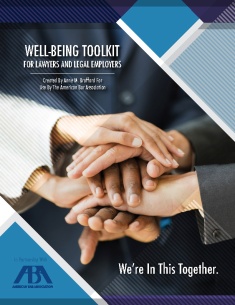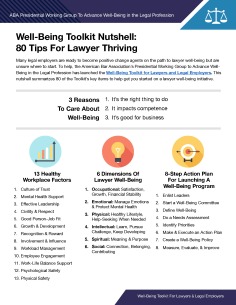The National Task Force on Lawyer Well-Being’s 2017 report shined a spotlight on evidence that too many lawyers face mental health and substance use disorders or otherwise aren’t thriving. Wanting to support the effort to catalyze positive change, American Bar Association President Hilarie Bass formed a Presidential Working Group to Advance Well-Being in the Legal Profession in September 2017. Its focus is on helping legal employers support healthy work environments, which are critical for lawyer wellness. Research shows that if workplace cultures support well-being, lawyers will be better able to make good choices that allow them to thrive and be their best for clients, colleagues, and work organizations.
Many legal employers are ready to become positive change agents but have been unsure where to start. The new Well-Being Toolkit for Lawyers and Legal Employers is designed to help. It offers tools and practical guidance for legal employers who want to join the lawyer well-being movement by launching organizational initiatives. The Toolkit, created by Presidential Working Group member Anne Brafford (a lawyer and organizational science researcher) can be viewed as a design prototype. It is meant to be a living document that will continue to develop and improve—an effort in which you are encouraged to participate. You can do so by trying out the Toolkit and offering feedback on what’s helpful, what can be improved, and what other resources are available. The Toolkit is offered as another step on the path to lawyer well-being—to help lawyers be their best as they carry out their critical roles contributing to the vitality of our government, business sector, community safety, and individual lives.
Also available is the Well-Being Toolkit Nutshell: 80 Tips For Lawyer Thriving, summarizing 80 of the Toolkit’s key items to help get you started on a lawyer well-being initiative.
Note for Use: The Toolkit is filled with electronic hyperlinks to websites and online resources that appear in blue underlined type. As a result, it is intended primarily for online viewing. If you decide to print the document in hard copy, select “fit to page” in your print dialogue box to ensure proper printing.




